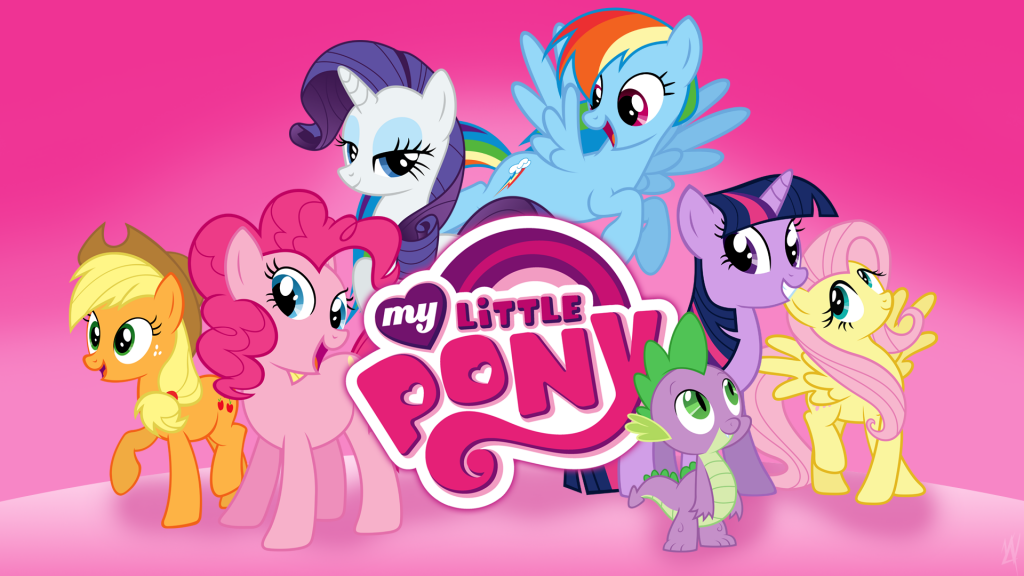 |
| MyLittleVisuals |
Brace
yourselves -- this blog is about to become 20% cooler. Or 20% awesomer.
Or maybe 20% radical-er? Like Twilight Sparkle, I’m not sure what the
difference is, nor do I particularly care.
However,
I do care about a character who not only knows the difference, but
probably defined it. Rainbow Dash is the self-proclaimed coolest pony in
Ponyville, a pegasus whose weather-regulating duties and enormous ego
place her both literally and figuratively above the rest of the
population. While the other ponies explicitly recognize her positive
qualities on several occasions, she’s her own best cheerleader; as
Applejack observes, she has a habit of “tootin’ her own horn louder than
the brass section of a marching band.” Taking the opportunity to
describe herself in a single word, she chooses
“super-ultra-extreme-awesomazing.” According to Rainbow Dash, the world
revolves around her; it’s no surprise, then, that most Rainbow
Dash-focused episodes revolve around her need to be the best.
Rainbow
Dash has built her identity on her presumed superiority, and there’s no
better way to prove it than in competition. This is why she goes up
against Applejack in the Iron Pony competition, and why she stoops to
cheating: her self-perception depends on her victory. When she decides
to get a pet, she pits the top candidates against each other in a series
of tests of their athleticism and personality. It doesn’t occur to her
that this might be a strange way to find a companion until she is saved
by an animal that seems to be the least suitable pet for a lightning
fast flier: a tortoise. She comes to understand that tenacity and
faithfulness trump speed, agility, and radicalness.
This
is a particularly interesting lesson for one reason: Rainbow Dash’s
Element of Harmony is loyalty. The first time she demonstrates this
quality is in the first two-part episode, when she is forced to choose
between helping her friends and joining an elite flying team. Since her
only dream is to become a Wonderbolt, the latter represents a real
temptation. This becomes even more apparent with further viewing, as we
come to realize that, this early in the show, Rainbow Dash finds Pinkie
Pie irritating, thinks that Fluttershy is largely useless, and hasn’t
had a chance to get to know Twilight Sparkle. It’s hard to imagine any
scenario in which she would have spent time with Rarity, and her
relationship with Applejack seems to be based on a shared
competitiveness. She owes these people her loyalty only because they’ve
been stuck together by circumstance. Still, she chooses them over her
dream, and saving Equestria over satisfying her own self-interest. Like
Rarity, whose Element of generosity seems more than a little at odds
with her overtly selfish nature, Rainbow Dash must overcome negative
aspects of her own personality to bring positive aspects to light.
This
leads us to an interesting path of inquiry, as we have to wonder what
produces an ego the size of a small planet in a pony who is supposed to
be the embodiment of devotion to others. I’d like to posit a couple of
theories, suggested by the events of “Sonic Rainboom” and “The Cutie
Mark Chronicles.” The first is that Rainbow Dash was something of a
flying prodigy, a fact which she discovered the first time she
successfully performed a sonic rainboom, a feat so rare that it’s
usually dismissed as an “old mares’ tale.” Rainbow Dash herself
describes the experience as the time that she “made the impossible
happen.” Knowing that you can do something that everyone else can only
dream of is bound to go to your head.
The
second theory draws its inspiration from the evidence that Rainbow Dash
was bullied. Their shared experience with bullying connects Rainbow
Dash and Fluttershy as foils. Fluttershy’s response to bullying was to
withdraw even further into herself, and her experiences cause her to
have panic attacks brought on by flashbacks. By contrast, Rainbow Dash
responds directly to her bullies, parrying their threat that she’s going
down with a jab of “In history, maybe.” She stands up to them when they
tease Fluttershy, and she explicitly frames this confrontation and the
ensuing race to prove herself against the bullies as a situation in
which she “stood alone against all odds to defend Fluttershy’s honour.”
She builds herself up, and it makes me wonder if it was an attempt to
prevent them from breaking her down. Initially, it’s possible that she
developed her self-confidence as a shield against barbed insults.
There
are moments when her self-confidence flags and she is left vulnerable.
This occurs most obviously in “Sonic Rainboom,” in which Rainbow Dash
suffers a blow, finding that she can no longer create a sonic rainboom.
In this episode, all of her bluster becomes just so much hot air, as she
tries not to show her friends that she doubts her abilities. The
problem with knowing that you’re the best is that you are inevitably
faced with situations that could prove you wrong. This early in Rainbow
Dash’s character arc, however, she is far too fragile to face a fact
that would undermine her entire worldview. She emerges from the
competition as the winner, but her confidence has nevertheless been
shaken by the very idea that she could fail.
In
the second season, Rainbow Dash is once again confronted with the
possibility that she is not, as Wolverine might say, the best there is
at what she does. This occurs in one of my favourite episodes, “The
Mysterious Mare Do Well.” In this episode, Rainbow Dash becomes addicted
to the attention she receives for performing heroic, life-saving deeds.
As one might expect, the extra accolades turn the already egotistical
pegasus into the kind of person who waits until she has finished signing
autographs to save ponies in imminent danger. Just when it seems like
Rainbow Dash’s ego has grown to the point that it needs its own punny,
equine town name (may I suggest Naneighmo?), a new hero bursts onto the
scene. A combination of Batman and Darkwing Duck, the Mysterious Mare Do
Well quickly proves herself more powerful, more perceptive, more
effective, more modest, and more popular than Your Friendly
Neighbourhood Rainbow Dash. Feeling threatened, Rainbow Dash seeks to
expose Mare Do Well’s identity, only to learn that her rival was
actually her friends, working together to teach her to act with grace
and humility.
In
the third season, we see how well this lesson took. “Wonderbolts
Academy” takes Rainbow Dash to the eponymous training camp, where she
has the opportunity to prove her mettle and impress her idols. There she
meets Lightning Dust, a pegasus who shares her need to be the best.
When the trainees are paired off, Lightning Dust and Rainbow Dash become
a team, the former as lead, the latter as wing pony. Rainbow Dash
protests her placement, but the instructors inform her that Lightning
Dust is willing to push herself harder. The problem is that, while she
is pushing herself, she pays no mind to the ponies she’s pushing out of
her way. Finally, after a cyclone Lightning Dust created almost kills
the other members of the Mane Six, Rainbow Dash gives the instructor a
report of her partner’s dangerous antics. Interpreting the instructor’s
silence as tacit approval of Lightning Dust’s methods, Rainbow Dash
quits.
This
is Rainbow Dash’s defining moment and the zenith of her character arc
thus far. Lightning Dust can be read as the embodiment of Rainbow Dash’s
reckless ambition or, perhaps, a reflection of what she might have been
had she not had the mellowing influence of her friends. By turning her
in, Rainbow Dash rejects this part of herself. While she still wants to
be the best and yearns for a spot on the Wonderbolts, if the only way to
achieve these goals is to endanger other people, she is willing to let
these dreams go. Rainbow Dash’s reward for this action is a kind of
anagnorisis, as she realizes that being decent is more important than
being the best. The fact that the instructor kicks Lightning Dust out,
reinstates Rainbow Dash as a lead pony, and praises her for sticking to
her principles is just a bonus.
Last
week, I argued that the show’s treatment of Fluttershy and Rarity
demonstrates a commitment to rehabilitating girliness as a positive
concept. This week, I’d like to suggest that Rainbow Dash’s
characterization as an arrogant jock, a role usually reserved for male
characters, represents another part of the show’s pro-woman project.
Before I get into the specifics of Rainbow Dash’s treatment, I’d like to
discuss a subtle linguistic shift that the show employs that affects
the ponies more generally. In Equestria, all-female groups are never
called “guys -- in fact, if I’m not mistaken, otherwise all-female
groups that include Spike are also never described using this masculine
terminology. Instead, the Mane Six address their group as “ladies” or
“girls.” Female, not male, operates as the assumed norm.
This is why it’s important to incorporate a well-known male character type into a group of girls; MLP’s
target audience is growing up in a media environment that shows them
time and time again that there is one set of activities and behaviours
for girls and another, much larger, much more well-regarded set of
activities and behaviours for boys. By making Rainbow Dash an athlete,
the show suggests that sports should not be considered an inherently
masculine pursuit. By giving her a massive ego, the show affords itself
the opportunity to teach girls how to act with grace and humility
without having to stay silent about the full extent of their
awesomeness. By having her discover a love of reading, the show lets its
young viewers know that brawn and brains aren’t mutually exclusive, and
that girls should be proud of having both. Finally, by not drawing
attention to its subversion of the stereotypical male jock character, My Little Pony: Friendship is Magic
normalizes the idea of the self-confident, athletic girl. I’ll be
honest: that kind of critical work makes the show about 20% cooler all
on its own.
Verdict: Actual strong female character
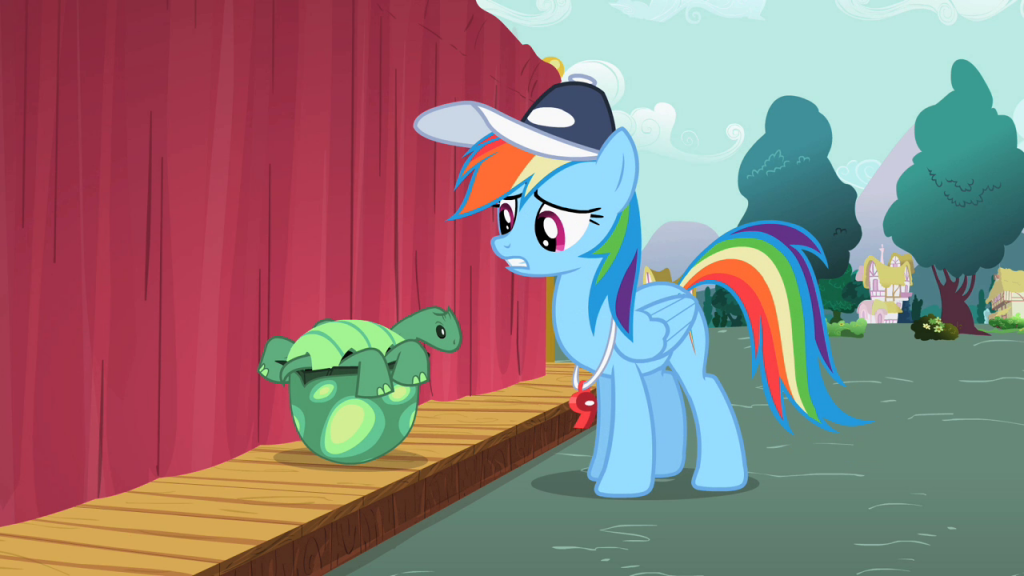
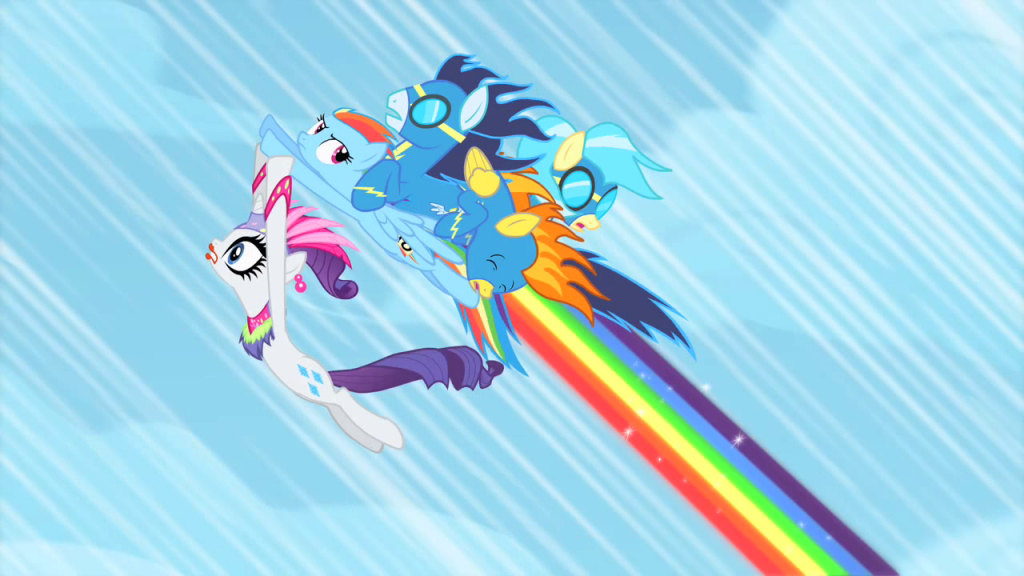
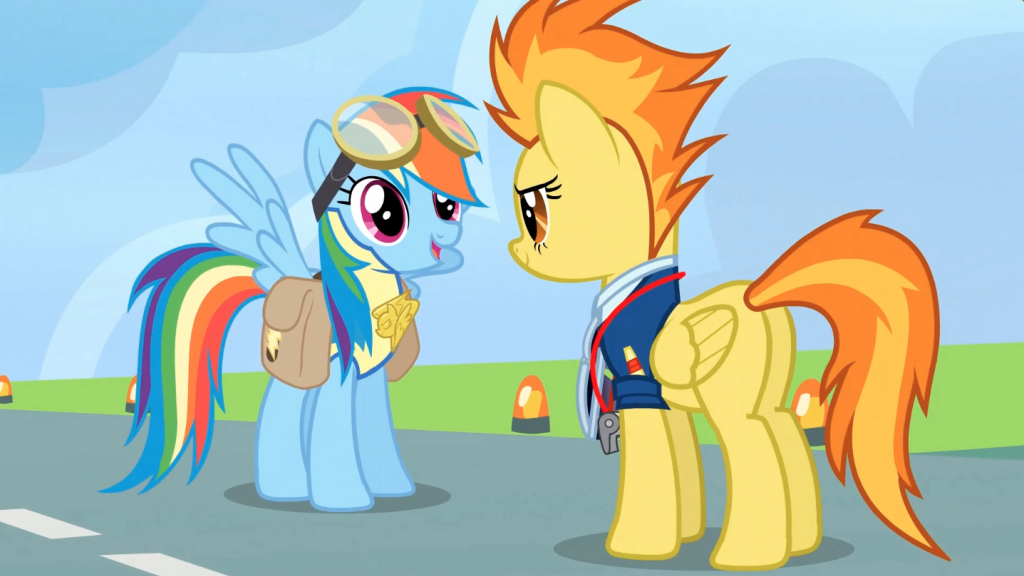
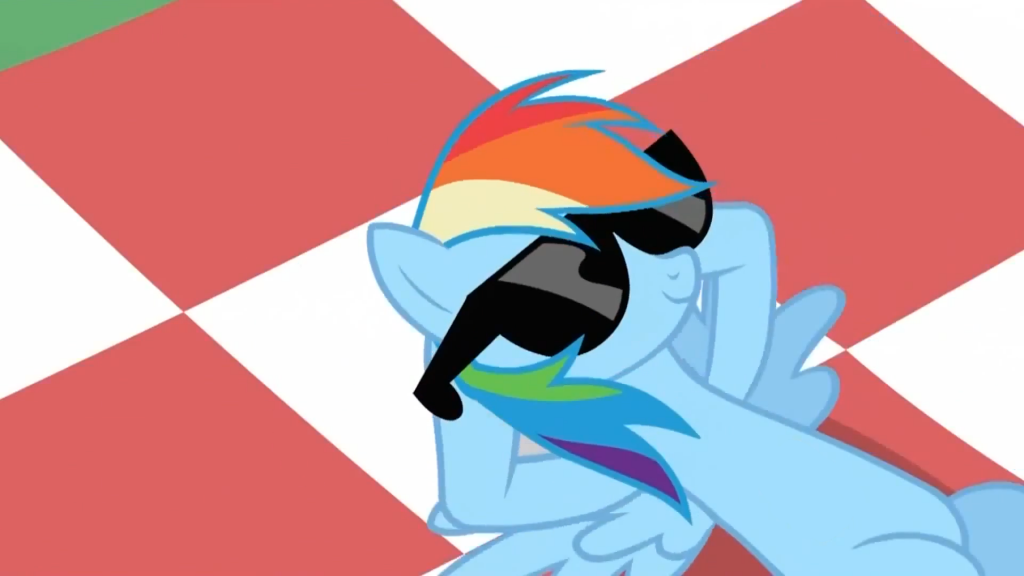
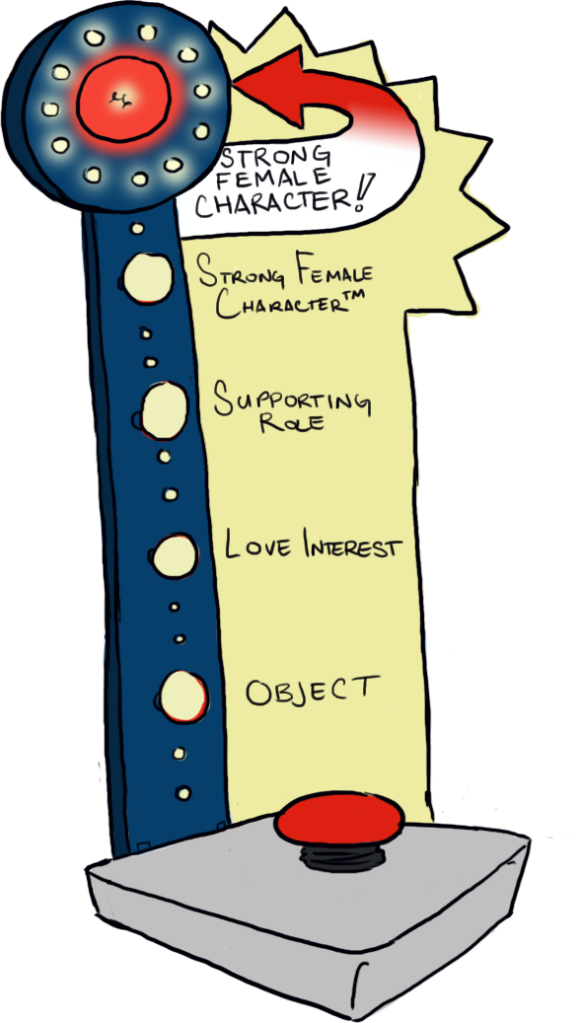
"Mysterious Mare Do Well" is terrible at teaching a moral. It's hypocrisy. You can't say "don't do something" & then do it yourself. Also: They humiliated her, instead of talking to her.
ReplyDeleteYou're right. Why can't she have her time to shine.
Delete